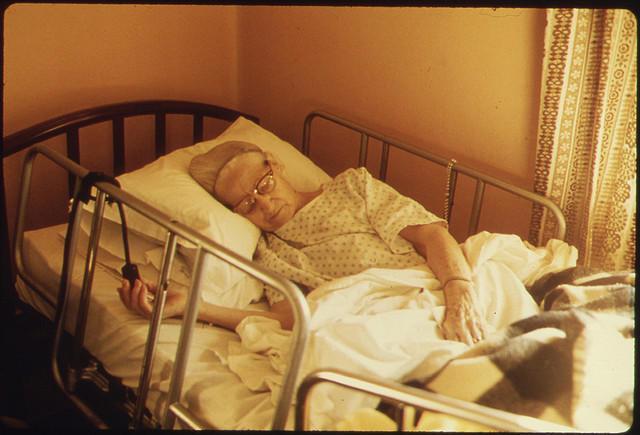

Dignity Therapy is a brief form of psychotherapy developed by Harvey Chochinov, MD with a goal of conserving a dying individuals sense of dignity. It attempts to address sources of psychosocial and existential distress, all the while giving individuals a chance to record the meaningful aspects of their lives in a written document they can pass down to their survivors.
Dignity therapy is administered by trained health care professionals (you too can get trained – just go to the Dignity in Care website to learn more). Sessions last between 30 to 60 minutes and revolve around a series of open-ended questions that encourage patients to talk about important aspects of their lives, hopes, wishes for loved ones, lessons learned, and things they wanted remembered by those they were about to leave behind. The questions used in Dignity Therapy include:
- Tell me a little about your life history, particularly the parts that you either remember most or think are the most important? When did you feel most alive?
- Are there specific things that you would want your family to know about you, and are there particular things you would want them to remember?
- What are the most important roles you have had in life (eg, family roles, vocational roles, community-service roles)? Why were they so important to you and what do you think you accomplished in those roles?
- What are your most important accomplishments, and what do you feel most proud of?
- Are there particular things that you feel still need to be said to your loved ones or things that you would want to take the time to say once again?
- What are your hopes and dreams for your loved ones?
- What have you learned about life that you would want to pass along to others? What advice or words of guidance would you wish to pass along to your son, daughter, husband, wife, parents, or other(s)?
- Are there words or perhaps even instructions that you would like to off er your family to help prepare them for the future?
- In creating this permanent record, are there other things that you would like included?
The conversation that flows form these questions is subsequently recorded, transcribed, edited and returned to the patient to make any changes before a final version is produced that can be shared with family and friends.
This sounds like a wonderful task to do with patients. The main question though is whether it is as helpful as it purports itself to be? A recent study by Chochinov published in Lancet Oncology helps to answer the question, although the results are somewhat mixed. The authors enrolled individuals who were currently receiving palliative or hospice care and who had an estimated prognosis of less than 6 months. They randomized 326 of these patients into three groups: dignity therapy, standard palliative care, and client-centered care. (Client-centered care per the study involved a “supportive psychotherapeutic approach, in which the research nurse therapist guides the patient through discussions that focus on here-and-now issues”)
No difference was found between the three groups in any of the multiple primary outcomes that measured distress. These included any difference between before and after study measurements in the Functional Assessment of Chronic Illness Therapy Spiritual Well-Being Scale, the Patient Dignity Inventory, the Hospital Anxiety and Depression Scale (HADS), items from the Structured Interview for Symptoms and Concerns, a two question Quality of Life Scale, and the modified Edmonton Symptom Assessment Scale.
The authors attributed these negative results to a floor effect as the level of distress in this population was pretty low. They highlight though the significant improvements in the secondary outcomes. These outcomes were addressed by a survey done after study completion with questions addressing patients experience of participation in the study and how it had affected them and their family. Patients who received dignity therapy were significantly more likely than those who received standard end-of-life care to say the treatment was helpful, improved their quality of life and sense of dignity, and that it had or would be of help to their family.
To be honest, I’m not sure what to make out of the secondary outcomes. No data is given on how close to the end of the study the survey was given, but I’m guessing pretty close to the end given that these patients are at the end of life. Why then the big difference in primary and secondary outcomes? It seems that more individuals believed their quality of life improved with dignity therapy (secondary outcome), however their measured quality of life using the pre-post data didn’t differ (primary outcome). So, is Dignity Therapy truly better in improving quality of life or is it just that people felt more connected with the therapists in Dignity Therapy so decided to rate it higher when answering the survey?
Another big question that this study raises for me is whether I could justify using the resources we have on something like Dignity Therapy? Dignity therapy in this trial seems like a lot of work. Just the transcribing and editing of the patient interviews must take a significant chunk of ones day. Plus the training and supervision in this trial will probably never be repeated in real clinical practice (initial continuous supervision of therapists followed by group supervision every 6-8 weeks, and continuous review of random samples of transcripts).
Then again, Dignity Therapy may give individuals at the end of life an opportunity to share things with their family members that they may not otherwise share, like regrets, requests for forgiveness, and expressions of love.
What do you think?
by: Eric Widera



